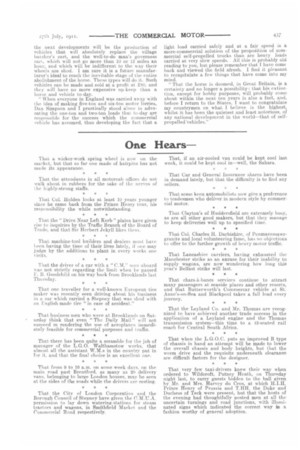One Hears—
Page 3

If you've noticed an error in this article please click here to report it so we can fix it.
That a wicker-work spring wheel is now on the market, but that so far one made of hairpins has not made its appearance. * * * That the attendants in all motorcab offices do not walk about in rubbers for the sake of the nerves of t he highly-strung staffs.
That Col. Holden looks at least 10 years younger since he came back from the Prince Henry tour, his responsibility the while notwithstanding.
That the "Drive Near Left Kerb" plates have given rise to inquiries by the Traffic Branch of the Board of Trade, and that Sir HerbertJekyll likes them.
That machine-tool builders and dealers must have been having the time of their lives lately, if one may judge by the additions to plant in every works one visits.
That the driver of a car with a "CM." man aboard was not strictly regarding the limit, when he passed F. B. Goodehild on his way back from Brooklands last Thursday.
That one traveller for a well-known European tire maker was recently seen driving about his business in a ear which carried a Stepney that was shod with an English-made tire "in ea-se of accident."
That business men who were at Brooklands on Saturday think that even " The Daily Mail" will not succeed in rendering the use of aeroplanes immediately feasible for commercial purposes and f raffle.
That there has been quite a scramble for the job of manager of the L.G.O. WaIthamstow works, that almost all the assistant W.M.s in the country put in for it. and that the final choice is an excellent one.
That from 9 to 10 a.m. on some•week days, on the main road past Brentford, as many as 20 delivery vans, belonging to large London houses, may be seen at the sides of the roads while the drivers are resting.
That the City of London Corporation and the Borough Council of Stepney have given the C.M.I.T.A. permission to lay down watering-stations for steam tractors and wagons, in Smithfield Market. and the Commercial Bond respectively. That, if an air-cooled van could be kept cool last week, it could be kept cool in—well, the Sahara..
That Car and General Insurance shares have been in demand lately, but that the difficulty is to find any sellers.
That some keen automobilists now give a preference to tradesmen who deliver in modern style by commer cial motor.
That Clayton's of Huddersfield are extremely busy, as are all other good makers, but that they manage to keep deliveries well up to specified time.
That Col. Charles H. Darbishire, of Penmaeninawrgranite and local volunteering fame, has no objections to offer to the further growth of heavy motor traffic.
That Lancashire carriers, having exhausted the Manchester strike as an excuse for their inability to supply wagons, are now wondering how long this year's Belfast strike will last.
That chars-à-banes services continue to attract many passengers at seaside places and other resorts, and that Butterworth's Commercar vehicle at St. Anne's-on-Sea and Blackpool takes a full load every journey.
That the Leyland Co. and Mr. Thomas are recognized to have achieved another trade success in the application of a Leyland engine and the Thomas transmission system—this time to a 42-seated rail coach for Central South Africa.
That when the L.G.O.C. puts an improved B type of chassis in hand an attempt will be made to lower the overall chassis and body heights, but that the worm drive and the requisite underneath clearance are difficult factors for the designer.
That very few taxi-drivers knew their way when ordered to Wilderoft, Putney Heath, on Thursday night last, to carry guests bidden to the ball given by Mr. and Mrs. Harvey du Oros, at which Prince Henry of Prussia and T.HH. the Duke and Duchess of Teck were present, but that the hosts of the evening had thoughtfully posted men at all the uncertain turnings and road junctions, with illuminated signs which indicated the correct way in a fashion worthy of general adoption.




















